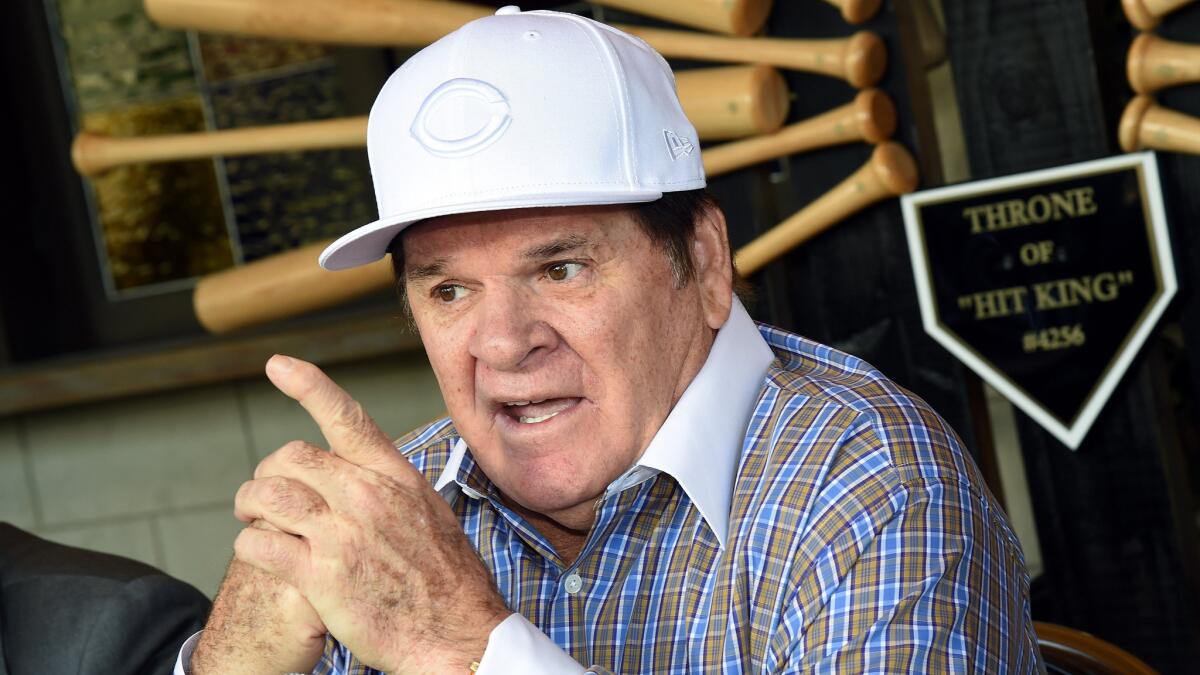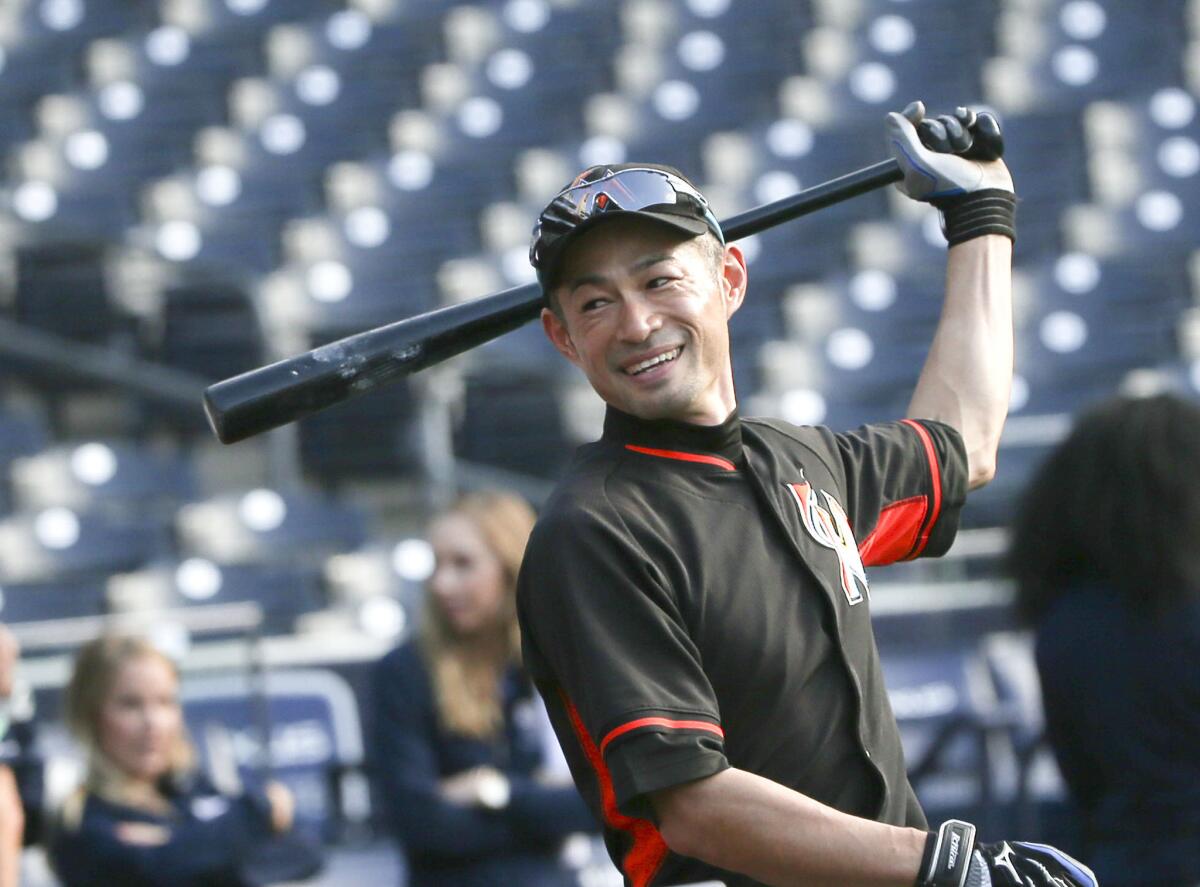Ichiro is a hit no matter what Pete Rose says

- Share via
Ichiro Suzuki could hit just about anybody, but he could not hit Scot Shields. It wasn’t for a lack of trying, though.
Reporters from Japanese media outlets shadow Japanese-born players wherever they go. No sooner would Shields retire Suzuki – he did so 28 times in 36 at-bats – than a Japanese reporter would appear at Shields’ locker, kindly asking the Angels reliever for the secret to his success.
Shields politely declined, time after time. Bud Black, then the Angels’ pitching coach, marveled at the persistence of the reporter. Suzuki, perhaps the greatest contact hitter of his generation, would have to find some other way to solve the riddle of Shields, the unimposing setup man who struck him out 40% of the time.
As Suzuki reached one milestone and closed in on another, those are the kinds of stories we should be telling, tales of the magician who could direct the ball with his bat. His is the kind of greatness we should be celebrating.
Instead, we are talking about Pete Rose. Sadly, Rose crashed Suzuki’s party, grabbed the spotlight and turned it on himself.
“Pete being Pete,” Angels broadcaster and two-time All-Star pitcher Mark Gubicza said. “Pete doesn’t miss an opportunity to be Pete.”

On Wednesday, Suzuki surpassed Rose for a sort of global hit leadership. Rose had 4,256 hits in the major leagues. Suzuki passed that figure with two hits – an infield single and a doouoble – in Miami’s game against the San Diego Padres. He has 2,979 hits in the majors and 1,278 in the Japanese league.
Rose would still be the major league leader in hits, just as Barry Bonds is the leader in home runs. Sadaharu Oh hit 868 home runs, but Bonds remains the major-league leader at 762 – the most in the best league in the world.
All Rose had to do was tip his cap to Suzuki, then keep on selling his autographed “Hit King” merchandise. If the Japanese fans wanted to consider Suzuki a hit king all their own, really, who cares?
“It sounds like in Japan, they’re trying to make me the Hit Queen,” Rose told USA Today.
Rose is a product of his time, even if he is a particularly bombastic one. It is no longer enough to appreciate. We have to rank everything, embrace debate, render a hot take.
Rose or Suzuki, who ya got?
Pete’s fairly blunt.Good for him. If I were the Hit King, I might be too.
— Hall of Famer and Minnesota Twins manager Paul Molitor
“You don’t have to rank anybody like that,” said the Hall of Fame voice of reason in the Angels’ clubhouse, Albert Pujols.
In the major leagues alone, Suzuki needs 21 more hits for 3,000. He would become the 30th player with 3,000 hits. The only ones not in the Hall of Fame: Rose (for betting on baseball), Rafael Palmeiro (for using performance-enhancing drugs) and Derek Jeter and Alex Rodriguez (not yet eligible).
Rodriguez made his major league debut at 18, Jeter at 20, Palmeiro and Rose at 21. Suzuki did not make his major league debut until he was 27, after he had played nine years in Japan.
“Can you imagine if he were to come here” right away? Pujols said. “I think he would have easily broken Pete Rose’s record.
“Ichiro was the Pete Rose, pretty much, of baseball when he came up. You appreciate what both of the players did. Whether it’s Japan or whether it’s here in America, 3,000 hits are a lot of hits. It doesn’t matter where you do it.”
You don’t have to rank the Japanese leagues, to strain to put Suzuki’s feats into context by trying to determine whether baseball there is equivalent to double-A here, or triple-A, or something higher than triple-A but not quite the majors.
“It is apples and oranges,” said Hall of Famer and Minnesota Twins manager Paul Molitor.
Molitor said the focus on what he called the “combined record” obscured the recognition that should flow to Suzuki for a rare combination of performance and longevity.
Molitor would drop out of the top 10 on the all-time hit list if Suzuki’s Japanese totals were somehow added to his major league totals. He did not sound as aggrieved as Rose at that prospect.
“Pete’s fairly blunt,” Molitor said. “Good for him. If I were the Hit King, I might be too.”
Suzuki is 42. He has played professionally for 24 years.
“He’s probably got seven or eight years left in him,” Molitor said, presumably joking. “Maybe he’ll catch Pete legitimately one day. Who knows?”
Gubicza yields to no one in his admiration for Rose. He has an autographed Rose jersey on his wall, and the memory of sitting a few rows behind the dugout as his hometown Philadelphia Phillies – with Rose at first base -- won the 1980 World Series.
But Gubicza said Suzuki’s accomplishments ought to be appreciated, not qualified or otherwise diminished.
“I just marvel at the fact that he’s still hitting so well,” Gubicza said. “I think that’s what everyone should do. I think Pete should do it.”
He probably will, on the weekend Suzuki is inducted into the Hall of Fame, when Rose is sitting on a Cooperstown street selling “Hit King” autographs.
bill.shaikin@latimes.com
Twitter: @BillShaikin
More to Read
Go beyond the scoreboard
Get the latest on L.A.'s teams in the daily Sports Report newsletter.
You may occasionally receive promotional content from the Los Angeles Times.











